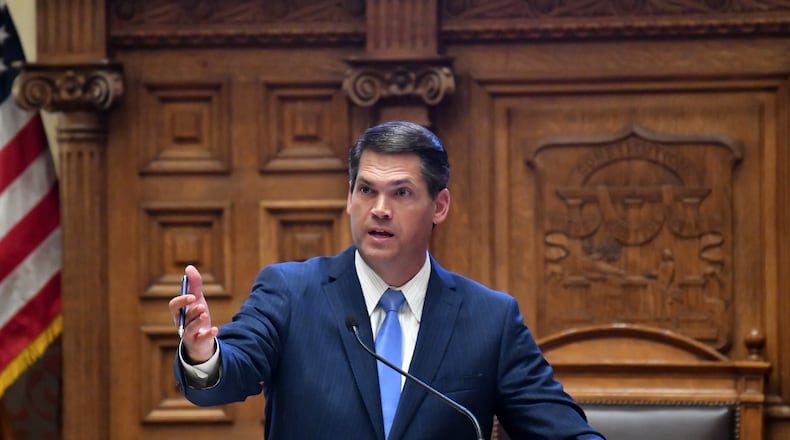For the first time, Lt. Gov. Geoff Duncan said he unequivocally opposed the passage of a Buckhead cityhood initiative this year, making him the most powerful Republican leader to reject the flagging effort to split Atlanta into two municipalities.
He outlined his stance in an interview Thursday with The Atlanta Journal-Constitution ahead of the state Senate’s passage of a measure he’s championed to create a new $100 million annual state tax credit that allows Georgians to direct taxes to support local law enforcement.
Duncan said new Atlanta Mayor Andre Dickens should have time to implement the measure, which was adopted by a unanimous vote, and move forward on other efforts to curb violent crime before state legislators consider whether to allow Buckhead to secede.
“This does more than just put up a shiny sign that says, ‘Welcome to Buckhead,’ ” Duncan said. “This actually takes a positive step in the direction of stemming the spread of crime.”
By opposing its passage this legislative session, Duncan joins a group of critics that includes every legislator who represents the city — all Democrats — and a handful of rural Republicans who believe it would violate the principle of local control.
Though it doesn’t scuttle the chances that cityhood passes this year, it significantly narrows its pathway in the Legislature.
As president of the state Senate, Duncan has the power to assign legislation to committees that would indefinitely stall the measure, as he did earlier this year with one Buckhead cityhood proposal.
And though he’s not running for a second term, Duncan still wields considerable power in the state Legislature.
“We’re in a pause mode. I and others have put out some important questions that have not yet been answered,” Duncan told the AJC.
“What is the strategy to stem crime? What is the strategy to deal with Atlanta public schools in the city’s footprint? What are the finance ideas around the bond package?” he said. “Those questions haven’t been answered.”
A ‘game changer’
Duncan’s remarks come on the heels of other setbacks to the cityhood movement.
Dozens of the most powerful businesses in Buckhead urged lawmakers this month to oppose the secession or remove the heart of the neighborhood’s center from the proposed boundaries, and the chances of passage were already dimming before Duncan’s remarks.
Credit: Curtis Compton / Curtis.Compton@
Credit: Curtis Compton / Curtis.Compton@
And some Republicans are distancing themselves from Bill White, the head of the cityhood movement, after a spate of controversies that included a social media post amplifying a racist message and another this week peddling false conspiracy theories about the death of the widely respected head of MARTA.
“Every day, it feels as though the city of Buckhead movement becomes less and less likely,” Duncan said. “I just continue to watch the cityhood movement take steps in the wrong direction, and I want to stay focused on the problems: crime and better services for the people of Atlanta.”
Under Duncan’s measure, Senate Bill 361, Georgians and corporations would get their state income tax bills reduced for writing a check directly to local police or sheriff’s foundations. The tax credits would be capped at $5,000 per individual and 75% of a corporation’s tax liability.
The proposal would require police and sheriffs’ offices to allocate the money toward efforts to raise pay for law enforcement officers, hire more personnel and make other improvements. None would be allowed to receive more than $5 million annually.
“It’s a game changer,” said state Sen. John Albers, R-Roswell.
Credit: HYOSUB SHIN / AJC
Credit: HYOSUB SHIN / AJC
It now moves to the House, where it’s expected to win widespread bipartisan support. It also was applauded by Dickens, who said it would provide “additional pathways for citizens to support public safety efforts.”
A ‘scalpel’ not a chainsaw
Duncan has expressed skepticism for weeks about the Buckhead cityhood push, which supporters say would help combat violent crime and meet the needs of residents. They have called for Buckhead residents to decide for themselves in a referendum.
Lobbying and fundraising efforts on both sides of the issue have ramped up since the legislative session began last month, and cityhood has become a key factor in statewide political races.
Gov. Brian Kemp and House Speaker David Ralston have both declined to endorse the legislation, but they also haven’t shut the door on the idea. Other Republicans, including former U.S. Sen. David Perdue, have backed cityhood.
Credit: Ben Gray for the AJC
Credit: Ben Gray for the AJC
Duncan framed his stance as an extension of his “GOP 2.0″ philosophy that advocates for a post-Donald Trump approach to conservative policies. His measure, he said, brings a “scalpel to work instead of a chainsaw” of creating a new city.
“The majority of the Senate is in search of details that seem to be missing. And before the Senate would even remotely decide to take up something like this, we need to see the details,” he said.
“What we don’t want to do is watch a group of people overpromise and underdeliver,” he said. “That would be a failed strategy as elected officials.”
Staff writer James Salzer contributed to this article.
About the Author
Keep Reading
The Latest
Featured






